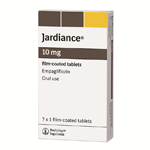 Since Eli Lilly ($LLY) and Boehringer Ingelheim announced that their SGLT2 med, Jardiance, had become the first to show it could lower the risk of major cardiovascular events, the question on the minds of industry watchers has been "How much?"
Since Eli Lilly ($LLY) and Boehringer Ingelheim announced that their SGLT2 med, Jardiance, had become the first to show it could lower the risk of major cardiovascular events, the question on the minds of industry watchers has been "How much?"
The pair answered that question on Thursday at the European Association for the Study of Diabetes (EASD) annual meeting, unveiling trial results showing that the med reduced the combined risk of heart attack, stroke and death from cardiovascular causes by 14% in high-risk Type 2 diabetes patients.
In the study, dubbed EMPA-REG OUTCOME, Jardiance also posted a 38% reduction in cardiovascular death, a 32% reduction in all-cause mortality and a 35% reduction in hospitalization for heart failure, the companies said.
The data "are pretty remarkable at first blush," Evercore ISI analyst Mark Schoenebaum wrote in a note to clients, adding that some of the presentation slides had generated applause at EASD. "The discussant called the data 'amazing.' I would agree."
While it's great news for Lilly and BI--and potentially Johnson & Johnson ($JNJ) and AstraZeneca ($AZN), makers of other members of the SGLT2 class--it's not so good for Merck ($MRK), whose top dog, Januvia, is a DPP-4 inhibitor. While the behemoth recently dispelled worries that it put patients at increased risk of heart attack, stroke or CV death, it hasn't been able to turn up a benefit--and that could help Jardiance poach sales.
And now that payers can weigh the magnitude of Jardiance's CV risk reduction, some of them may be ready to start making moves. In a recent survey of 23 payers, 45% said decisions to make any formulary changes would rest on the new data, Leerink Partners analyst Seamus Fernandez wrote in a note this week. Others, though, may wait to see how the American Diabetes Association responds; 83% of respondents said they'd take any ADA guideline changes into account.
Either way, though, don't assume Januvia and its DPP-4 brethren are headed to the scrap heap, Peter Stein, Merck's VP of clinical research in diabetes and endocrinology, told FiercePharma in an interview at the European Society of Cardiology Congress. Combinations "really are a part of how we treat diabetes, and not a small part--they're a major part," he said. And Merck, for one, is working on its own SGLT2 that could eventually become a DPP-4 tandem.
- read the release
Special Report: Top 10 best-selling diabetes drugs of 2013